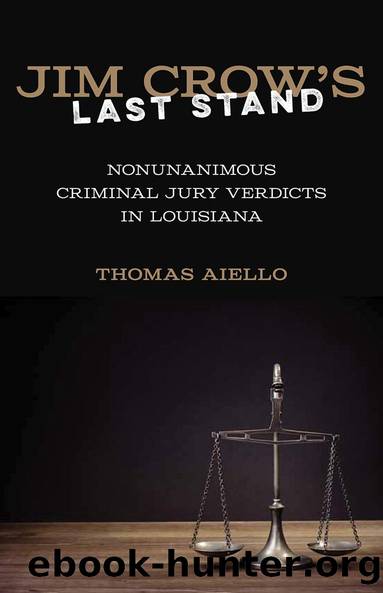Jim Crow's Last Stand by Thomas Aiello

Author:Thomas Aiello [Aiello, Thomas]
Language: eng
Format: epub
Tags: History, United States, State & Local, South (AL; AR; FL; GA; KY; LA; MS; NC; SC; TN; VA; WV), Social Science, Regional Studies, Law, Legal History
ISBN: 9780807172520
Google: BGHGDwAAQBAJ
Publisher: LSU Press
Published: 2019-09-02T01:42:44+00:00
III
Appellant also attacks as violative of the Equal Protection Clause the provisions of Louisiana law requiring unanimous verdicts in capital and five-man jury cases, but permitting less-than-unanimous verdicts in cases such as his. We conclude, however, that the Louisiana statutory scheme serves a rational purpose and is not subject to constitutional challenge.
In order to âfacilitate, expedite, and reduce expense in the administration of criminal justice,â State v. Lewis, 129 La. 800, 804, 56 So. 893, 894 (1911), Louisiana has permitted less serious crimes to be tried by five jurors with unanimous verdicts, more serious crimes have required the assent of nine of 12 jurors, and for the most serious crimes a unanimous verdict of 12 jurors is stipulated. In appellantâs case, nine jurors rather than five or 12 were required for a verdict. We discern nothing invidious in this classification. We have held that the States are free under the Federal Constitution to try defendants with juries of less than 12 men. Williams v. Florida, 399 U.S. 78 (1970). Three jurors here voted to acquit, but from what we have earlier said, this does not demonstrate that appellant was convicted on a lower standard of proof. To obtain a conviction in any of the categories under Louisiana law, the State must prove guilt beyond reasonable doubt, but the number of jurors who must be so convinced increases with the seriousness of the crime and the severity of the punishment that may be imposed. We perceive nothing unconstitutional or invidiously discriminatory, however, in a Stateâs insisting that its burden of proof be carried with more jurors where more serious crimes or more severe punishments are at issue.
Appellant nevertheless insists that dispensing with unanimity in his case disadvantaged him as compared with those who commit less serious or capital crimes. With respect to the latter, he is correct; the State does make conviction more difficult by requiring the assent of all 12 jurors. Appellant might well have been ultimately acquitted had he committed a capital offense. But as we have indicated, this does not constitute a denial of equal protection of the law; the State may treat capital offenders differently without violating the constitutional rights of those charged with lesser crimes. As to the crimes triable by a five-man jury, if appellantâs position is that it is easier to convince nine of 12 jurors than to convince all of five, he is simply challenging the judgment of the Louisiana Legislature. That body obviously intended to vary the difficulty of proving guilt with the gravity of the offense and the severity of the punishment. We remain unconvinced by anything appellant has presented that this legislative judgment was defective in any constitutional sense.
Download
This site does not store any files on its server. We only index and link to content provided by other sites. Please contact the content providers to delete copyright contents if any and email us, we'll remove relevant links or contents immediately.
2010-The City & the City by China Miéville(1968)
Anatomy of Injustice by Raymond Bonner(1651)
That Every Man Be Armed by Stephen P. Halbrook(1571)
ADHD on Trial by Michael Gordon(1565)
Injustices by Ian Millhiser(1487)
You Don't Own Me by Orly Lobel(1437)
Tell by Major Margaret Witt(1429)
Course Correction by Ginny Gilder(1402)
Broken Scales by Joel Cohen(1343)
Without Copyrights by Spoo Robert(1343)
A Vast Conspiracy by Jeffrey Toobin(1320)
First by Evan Thomas(1278)
J by Howard Jacobson(1250)
A Religious Orgy in Tennessee by H.L. Mencken(1240)
The Run of His Life: The People v. O. J. Simpson by Jeffrey Toobin(1195)
A Triumph of Genius: Edwin Land, Polaroid, and the Kodak Patent War by Ronald K. Fierstein(1193)
A History Of Thailand by Baker Chris(1172)
John Wayne Gacy by Judge Sam Amirante(1101)
Law 101: Everything You Need to Know About American Law, Fourth Edition by Jay Feinman(1085)
